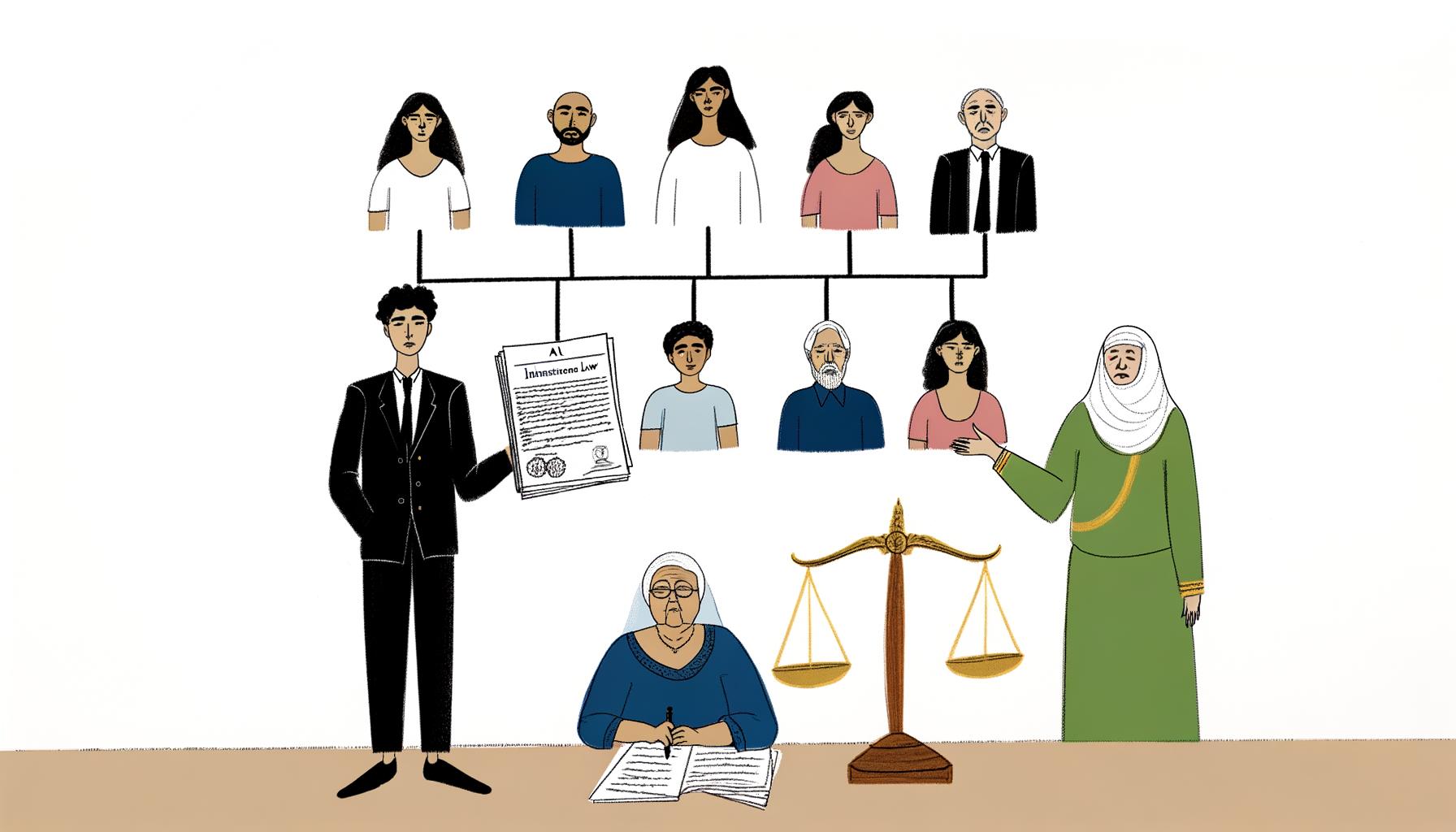When it comes to securing your legacy and ensuring that your assets are distributed according to your wishes, understanding inheritance law becomes paramount. Inheritance law governs the transfer of property, money, and other assets upon a person’s death.
This legal framework ensures that your estate is handled in a manner consistent with your intentions and helps mitigate potential conflicts among heirs or beneficiaries. For residents of Newport Coast, having a grasp of these laws is not just beneficial but essential for effective estate planning.
Newport Coast residents must be particularly mindful of local inheritance laws. Though federal regulations provide a broad structure, state-specific statutes can significantly influence the nuances of how estates are managed and distributed.
California’s inheritance laws have their own stipulations that vary from those in other states, affecting everything from tax obligations to the probate process itself. Being informed about these regulations can help Newport Coast residents avoid common pitfalls and ensure their final wishes are honored without unnecessary legal complications.
Moreover, an understanding of local inheritance laws can offer peace of mind by clarifying what happens if someone dies intestate – that is, without a will. Knowing how assets would be allocated under default state rules enables individuals to see the importance of precise legal documents such as wills and trusts.
Such preparation not only safeguards one’s assets but also provides clarity and security for surviving family members during what is often an emotionally tumultuous time. Whether you’re drafting your first will or updating existing estate plans, comprehensive knowledge in this area empowers you to make well-informed decisions aligned with both legal requirements and personal desires.
Key Terminology in Inheritance Law
Understanding the terminology used in inheritance law is crucial for Newport Coast residents looking to navigate estate planning smoothly. Knowledge of these terms ensures that individuals can make informed decisions and communicate effectively with legal professionals. Some of the most critical terms you should be familiar with include wills, probate, intestate, and beneficiaries.
Wills: The Cornerstone of Estate Planning
A will is a legal document that outlines how an individual wishes their assets to be distributed after they pass away. Creating a valid will involves naming an executor-a person who will manage the distribution of your estate according to your wishes.
For Newport Coast residents, it’s essential to understand that specific legal requirements must be met for a will to be considered valid in California. These include the testator being at least 18 years old and mentally competent, having the will written and signed by the testator along with two witnesses who are not beneficiaries.
Probate: Legal Procedures for Asset Distribution
Probate is the court-supervised process that authenticates a deceased person’s will (if one exists) and oversees the distribution of their estate. Probate can often be lengthy and costly, requiring close adherence to state regulations. In Newport Coast, understanding how probate works can help residents prepare better and potentially expedite this process.
It’s critical because even minor oversights can lead to significant delays or disputes among heirs. Navigating probate efficiently requires knowing about filing deadlines, required documentation, and how local courts operate.
Intestate: When There Is No Will
Intestate refers to dying without a valid will in place. When someone dies intestate in Newport Coast, California’s intestacy laws dictate how their assets are distributed among surviving relatives.
Typically, this means assets go first to spouses and children; if neither exists, it extends outwards to other family members like parents, siblings, or more distant relatives. The absence of a will can often lead to complications and disputes among potential heirs, underscoring the importance of having legally recognized documents prepared well before one’s death.
Knowing these key terms empowers residents of Newport Coast to take proactive steps in managing their estates effectively under current inheritance law statutes.
Creating a Valid Will
To comply with inheritance law in Newport Coast, the will must be in writing, either typed or handwritten. The document needs to clearly state it is your Last Will and Testament. It’s also essential to appoint an executor who will manage your estate and ensure your directives are followed accurately.
Once these steps are completed, you should sign the will in front of two witnesses who are not related to you nor beneficiaries under the will. These witnesses must also sign the document in your presence.
Common pitfalls can invalidate a will if not properly addressed. For instance, failing to update your will after major life events like marriage, divorce, or the birth of children can complicate asset distribution.
Additionally, neglecting to include a residuary clause that accounts for any remaining property after specific bequests can leave parts of your estate subject to intestate succession laws. Consulting with an experienced attorney familiar with Newport Coast inheritance law can help you avoid these issues and ensure that all aspects of your estate planning are carefully considered.
| Requirement | Description |
|---|---|
| Minimum Age | 18 years old |
| Mental State | Sound Mind |
| Document Type | Written (typed or handwritten) |
| Witnesses Required | Two (not beneficiaries) |
The Probate Process in Newport Coast
What Is Probate and Why It’s Essential
Probate is the legal process that occurs after someone passes away, during which their estate is settled. This involves verifying any existing wills, assessing the value of assets, paying off debts, and distributing the remaining property to heirs and beneficiaries. Understanding probate is crucial because it ensures that the decedent’s wishes are carried out efficiently and legally.

For Newport Coast residents, navigating this process effectively can prevent potential family disputes and legal challenges. The probate court in Newport Coast plays an essential role in scrutinizing all aspects of the will’s validity and overseeing the proper administration of the estate.
Detailed Steps Involved in the Probate Process
The probate process begins by filing a petition with the local probate court to either admit a will to probate or appoint an administrator if no will exists. Next, the court issues “Letters Testamentary” or “Letters of Administration,” granting authority to manage and settle the estate.
Administrators are responsible for taking inventory of all assets including real estate, bank accounts, securities, and personal belongings. It’s also mandatory to notify creditors of the death so they can submit claims against the estate within a specified period.
After settling debts and taxes owed – which could involve liquidating some assets if necessary – distribution of the remaining property follows as per instructions in the will or state inheritance laws if there isn’t one. Inheritance law stipulates specific protocols for asset distribution when no valid will is present. Finally, a closing statement is submitted to show that all tasks have been completed according to legal requirements, leading to formal closure by the probate court.
How Newport Coast Residents Can Navigate Probate Efficiently
Efficiently handling probate requires organization, patience, and sometimes professional assistance. Newport Coast residents can benefit immensely from preparing detailed documentation ahead of time such as keeping well-structured financial records and updating their wills regularly. Additionally, seeking legal advice from attorneys specializing in probate can ease navigation through complexities related directly to California’s specific inheritance law statutes.
Engaging with reputable financial advisors who understand both local market conditions and broader economic influences helps safeguard asset value during potentially lengthy processes. Critically reviewing all relevant paperwork before submission can reduce processing times significantly while avoiding unnecessary court hearings which may otherwise arise from inaccuracies or disputes among heirs. Employing these strategies will contribute vastly toward ensuring a smoother transition through what can often be an emotionally charged period following a loved one’s departure.
Intestate Succession
When a Newport Coast resident passes away without having created a valid will, they are considered to have died “intestate.” In such cases, local inheritance law dictates how the deceased’s estate will be distributed among surviving relatives.
Newport Coast, like the rest of California, follows a strict set of rules known as intestate succession laws to determine who inherits property and assets. These laws prioritize close family members and establish an order of precedence that ensures spouses, children, and other immediate family members receive their fair share.
Intestate succession in Newport Coast is governed by California’s Probate Code, which outlines specific guidelines for asset distribution. If the deceased was married at the time of death, the surviving spouse typically inherits all community property and a portion of separate property gained during the marriage.
The remainder of any separate property may be divided among the decedent’s children or other descendants. The precise allocation depends on factors such as whether the deceased had multiple marriages or additional offspring from previous relationships.
If no spouse or direct descendants exist, intestate succession laws extend inheritance rights to other relatives like parents, siblings, nieces and nephews, and even more distant kin if necessary. A hierarchical system is used to identify eligible heirs in descending order of closeness.
Without immediate family members or close relatives, it’s possible that a person’s estate could ultimately escheat to the state if no lawful heir can be found. This underscores why understanding these laws-and planning accordingly with tools like wills and trusts-is essential for Newport Coast residents aiming to avoid potential complications for their loved ones.
- Surviving Spouse: Community property+portion of separate property
- Children/Descendants: Portion of separate property
- Parents/Siblings/Nieces/Nephews: In absence of closer relatives
- Distant Relatives: As per hierarchical order
- State Escheat: When no lawful heir exists
Given these intricacies, it’s clear that crafting a valid will can prevent many issues from arising upon one’s death. However, understanding how intestate succession works provides crucial insight into how estates may still be handled equitably even without expressed instructions from the decedent.
Trusts and Other Estate Planning Tools
Estate planning is a crucial part of protecting your assets and ensuring they are distributed according to your wishes. One of the primary tools used in estate planning is a trust. Residents of Newport Coast can benefit greatly by understanding the different types of trusts available to them, such as revocable living trusts, irrevocable trusts, and special needs trusts. Each type serves distinct purposes and offers various levels of control and protection for your assets.

Revocable living trusts allow you to maintain control over your assets during your lifetime while specifying how they will be managed and distributed upon your death. These trusts can be altered or revoked at any time, offering flexibility. Irrevocable trusts, on the other hand, cannot be changed once they are established but provide significant tax advantages and asset protection. Special needs trusts are designed to benefit individuals with disabilities without jeopardizing their eligibility for government benefits.
In addition to these types, Newport Coast residents should consider other estate planning tools like power of attorney and advanced healthcare directives. A power of attorney enables someone you trust to make financial decisions on your behalf if you become incapacitated. Advanced healthcare directives ensure that your medical preferences are honored in critical situations where you might not be able to communicate them yourself.
When comparing these tools with creating a will, it’s essential to understand the benefits each provides under inheritance law. Trusts often allow for quicker distribution of assets since they bypass probate court entirely, reducing time and legal expenses significantly. However, setting up a trust can be more complex than drafting a simple will, necessitating professional legal advice tailored specifically to Newport Coast’s unique regulations and requirements.
By actively engaging in comprehensive estate planning that incorporates a mix of wills, trusts, and other legal instruments, Newport Coast residents can better safeguard their legacy against potential challenges or disputes among heirs. With careful thought and appropriate guidance from qualified inheritance law attorneys, you can craft a robust plan that ensures clarity for all parties involved.
Rights of Heirs and Beneficiaries
Understanding the rights and responsibilities of heirs and beneficiaries is a crucial aspect of inheritance law. In Newport Coast, heirs are individuals who inherit from an estate due to a familial relationship with the deceased, whereas beneficiaries are those specifically named in a will or trust to receive assets. It’s important for all parties involved to be aware of their legal rights to ensure that the deceased’s wishes are faithfully executed and any disputes can be efficiently resolved.
One key right for both heirs and beneficiaries is the right to be informed. They are entitled to receive notifications regarding probate proceedings, including inventories of the estate’s assets and liabilities. This transparency helps ensure that there is no mismanagement or unfair distribution among inheritors. Furthermore, if any discrepancies or issues arise during the probate process, beneficiaries have the right to contest these matters in court with evidence supporting their claims.
When challenging or contesting a will in Newport Coast, it’s vital to understand on what grounds this can legally be done. Common reasons include allegations of undue influence, fraud, lack of mental capacity at the time of drafting the will, or improper execution according to state laws.
Hiring specialized legal counsel can make this process less cumbersome by providing expert guidance rooted in local inheritance law nuances. Recommendations for reputable estate attorneys can often be found through local bar associations or community legal resources.
| Relevant Terms | Definitions |
|---|---|
| Heirs | Individuals who inherit by virtue of familial relationships. |
| Beneficiaries | Persons named in a will or trust to receive assets. |
| Probate Process | A legal process for validating a will and distributing assets. |
Tax Implications of Inheritance
Inherited assets come with a variety of tax implications that Newport Coast residents need to be aware of. Both federal and state tax obligations can significantly impact the value of your inheritance, making it essential to understand these requirements.
At the federal level, estates exceeding a certain threshold are subject to estate taxes. As of recent years, the federal estate tax exemption is quite high, but it’s important to keep updated on any changes in legislation that may affect this exemption limit.
In California, inheritance law does not impose an inheritance tax; however, Newport Coast residents might still face capital gains tax issues depending on how they manage inherited assets. For instance, if you sell an inherited property, you will likely owe capital gains tax on the difference between its current market value and its value at the time of inheritance.
This is less burdensome than one might expect due to the “step-up” in basis rule, which adjusts the property’s acquisition value to its fair market price at the date of death.
Individuals looking to minimize their tax liabilities should consider various estate planning strategies. Trusts can play a crucial role here by potentially reducing taxable income and providing better control over asset distribution. Different types of trusts offer distinct benefits; for example, irrevocable trusts can remove assets from your taxable estate altogether.
Moreover, charitable remainder trusts not only reduce taxable estate but also offer immediate income tax deductions. Consulting experts in inheritance law can help Newport Coast residents structure these tools most effectively according to their unique circumstances.
Legal Assistance and Resources
When navigating the complex world of inheritance law, securing knowledgeable legal assistance is paramount. Specialized inheritance lawyers possess the expertise required to navigate Newport Coast’s unique regulations and ensure that your estate planning aligns with local laws.

Their guidance can prevent costly mistakes and ensure that your assets are distributed according to your wishes. It’s essential to seek an attorney who has a comprehensive understanding of both state and federal inheritance laws to provide you with well-rounded advice tailored to your circumstances.
Newport Coast residents have access to various local legal resources that can aid in management and execution of their inheritance plans. The Orange County Bar Association offers a referral service connecting individuals with qualified estate planning attorneys within the Newport Coast area.
Furthermore, several community-based workshops and seminars hosted by legal professionals are available, offering valuable insights into estate planning strategies specific to California’s legal landscape. Utilizing these resources can equip you with the knowledge necessary for making informed decisions about your estate.
Choosing the right attorney involves more than just checking credentials; it requires finding someone who fits well with your personal needs and preferences. Start by looking for lawyers who specialize in inheritance law and have experience working within Newport Coast. Personal recommendations from friends or family can also be invaluable sources for finding reliable legal counsel.
During consultations, assess whether the attorney is communicative, understands your goals, and explains complex matters clearly. Establishing a relationship based on trust and mutual understanding will ensure a smoother process as you work together to secure your legacy.
Conclusion
Inheritance law is a cornerstone in ensuring that your legacy is handed down according to your wishes, and understanding it is crucial for Newport Coast residents. Estate planning goes beyond just drafting a will; it encompasses various tools and processes like probate, trusts, and tax considerations. By educating yourself on these elements and staying informed about local inheritance laws, you minimize potential conflicts and ensure a smoother transition of assets.
Taking proactive steps in estate planning is an invaluable move. From drafting a valid will under the specific stipulations required in Newport Coast to navigating the complexities of the probate process, each action solidifies your intentions for the distribution of your estate. Additionally, familiarizing yourself with intestate succession rules can prepare you for possible complications if there’s no will. It’s important to also understand the rights of heirs and beneficiaries so everyone involved knows what to expect.
Securing competent legal assistance cannot be overstated. Consulting with specialized inheritance law attorneys ensures that you make well-informed decisions tailored to Newport Coast’s specific requirements. Utilize local resources and choose an attorney who understands your unique needs. By doing so, you protect not only your wealth but also provide peace of mind for your loved ones, ultimately securing a smooth future for your legacy.
Frequently Asked Questions
What Is the Inheritance Law in Us?
In the United States, inheritance law is largely governed by state statutes and can vary significantly from one state to another. Generally, these laws determine what happens to a person’s estate after they pass away, including how property is distributed among heirs and beneficiaries. Most states follow the Uniform Probate Code (UPC) to some extent, which simplifies the process of transferring assets.
If someone dies with a valid will, known as dying “testate,” the will directs how their estate should be distributed. If they die without a will, known as dying “intestate,” state laws determine how the property is divided among surviving family members.
Who Has the Right to Inheritance?
The right to inheritance typically belongs to immediate family members first and foremost—usually spouses, children, and sometimes parents or siblings if there are no closer relatives. When a person dies testate, their chosen beneficiaries listed in their will are entitled to inherit according to its terms.
In cases of intestacy where no will exists, state laws dictate an order of priority that generally favors close kin over distant relatives or non-family members. Adopted children generally have the same inheritance rights as biological children under most state laws.
What Is the Basic Law of Inheritance?
The basic law of inheritance in the US revolves around two principles: testamentary freedom and intestate succession. Testamentary freedom allows individuals to distribute their estate as they see fit through a legally valid will provided it complies with statutory requirements such as being witnessed properly and signed by the testator.
Intestate succession laws come into play when someone dies without a valid will or other form of estate planning like a trust; these laws outline a hierarchy for distributing property among surviving relatives.
What Is the Rule of Inheritance?
The rule of inheritance stipulates that property should be distributed according to either the decedent’s last legally valid will or, if there isn’t one, via intestate succession statutes dictated by state law. Under these rules, approved debts and taxes must be settled before any distribution occurs.
Probate courts often oversee this process to ensure everything follows legal procedures accurately, especially in scenarios where wills are contested or unclear.
Who Is Not Allowed to Inherit?
Individuals who may not be allowed to inherit include those who have been explicitly disinherited in a legitimate will or legal document created by the deceased individual before death. Additionally, most states enforce what’s known as “slayer statutes” which prevent anyone criminally responsible for intentionally causing someone’s death from benefiting from their victim’s estate.
In certain jurisdictions, creditors may also diminish potential inheritances if significant debt obligations exist against an estate that must be settled preferentially over distributions planned for heirs or beneficiaries.

